C#chart控件绘制折线图、柱状图、饼图、雷达图
转载来源:https://blog.csdn.net/u011854789/article/details/82946553
参考链接:
http://www.cnblogs.com/winshe/articles/6604406.html
https://blog.csdn.net/akof1314/article/details/5710866
http://www.360doc.com/content/13/1016/10/9981262_321805184.shtml
在.NET环境下微软提供了强大了图表控件,并给多了很多实例,关于图表的基本元素如下:
在这里插入图片描述
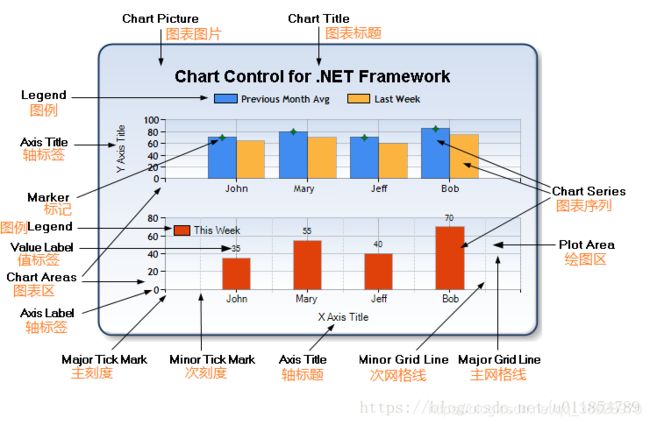
并且MSDN给出了创建图表的示例步骤,原文地址:http://msdn.microsoft.com/en-us/library/dd489237.aspx
在这里,我仅作为自己理解的,并实践的,以中文方式写出步骤,未免出错,还请参照MSDN。添加一个图表控件到应用程序:
1,在设计视图下,打开“工具箱
”;
2,在“Data
”分类下,拖动一个图表控件到设计区域;
3,在其属性中展开“ChartAreas
”子属性,弹出的“ChartAreas 集合编辑器
”中,这里包含了当前图表控件的所有图表区,并且注意此时此集合器已经包含了一个图表区,名称为"ChartArea1
";
4,点击“添加
”,新增一个图表区,请注意,在设计区域的图表缩小到原来的一半大小。这是因为新创建的图表区是放置在底部,但不包含一个数据系列;
5,在图表控件的“Series
”子属性,展开弹出“Series 集合编辑器
”,注意这里已经包含了一个序列,名称为”Series1
“;
6,点击”添加
“,新增一个序列,在其右边设置其属性,“ChartArea
”属性为ChartArea2
,“ChartType
”属性为Bar
,“Name
”属性为BarChart
,点击“确定
”完成。此时运行程序未出现任何结果,因为还没有数据;
添加数据到图表:
1,打开“Series 集合编辑器
”,在左边的”成员“中选择”Series1
“,在右边的属性区域点击展开”Points
“,弹出”DataPoint 集合编辑器
“;
2,点击”添加
“,在其右边属性的”YValues
“属性中输入值,重复这一步知道添加了5个数据点;
3,点击”确定
“,然后对”BarChart
“序列进行与第2步一样的操作;
4,”确定
“完成,运行程序可以在图表控件上看到两个图表区,显示着刚刚创建的两个序列的数据点。请注意这两个序列的不同图表类型。
添加图例到图表:
1,在图表控件属性中,点击”Legends
“,展开”Legend 集合编辑器
“,如果没有已存在的一个图例,那么就添加一个;
2,设置这个图例属性,其中”DockedToChartArea
“值为”ChartArea1
“,”Docking
“值为”Right
“,”IsDockedInsideChartArea
“值为”False
“;
3,再添加一个图例,设置属性其中”DockedToChartArea
“值为”ChartArea2
“,”Docking
“值为”Right
“;
4,点击”确定
“完成。此时图表区域的第二个图例显示为空。默认所有的序列都分配到第一个图例,你也可以分配每个序列到不同的图例;
5,打开”Series 集合编辑器
”,选择“BarChart
”项,在其“Legend
”属性中下拉列表选择“Legend2
”,完成运行程序。
添加标题到图表:
1,在图表控件属性中,点击“Titles
”,展开“Title 集合编辑器
”,点击“添加
”,在右边的属性“Text
”中输入图表的标题;
2,点击“确定
”,运行程序看效果。
使用注解标记图表上的数据点:
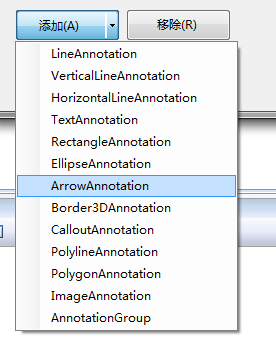
1,在图表控件属性中,点击“Annotations
”,展开“Annotation 集合编辑器
”;
2,点击“添加
”的下拉列表,选择“ArrowAnnotation
”,如图:
在这里插入图片描述
3,在右边的属性“定位点
”分类下,下列选择“AnchorDataPoint
”值为第一个序列的第一个数据点;
4,其具体属性“Height
”值为-5,“Width
”值为0,“AnchorOffSetY
”值为-2.5;
5,在其属性“杂项
”展开“SmartLabelStyle
”子属性,设置“IsOverlappedHidden
”为”False“;
6,点击”确定
“,运行程序。
程序效果如图:
在这里插入图片描述
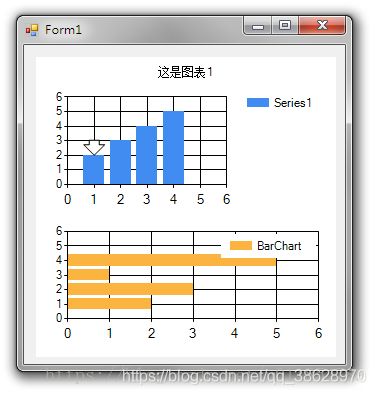
最近公司项目要用到Chart图表控件,这是一个比较老的东西了,目前网络上似乎已经不太流行这个控件,但是只要配置了相关的属性,效果还是可以的。前前后后摸索了好久,接下来谈谈这个件控件最重要的几个属性。
1.ChartAreas属性
ChartAreas属性指绘图区,一个控件可以有多个绘图区,比如我要在同一个控件内显示饼图和柱状图,肯定不能放在同一个ChartAreas区域内,应该在同一个Chart控件里增加两个ChartAreas并分别绑定Series对象。所以ChartAreas属性对应的是一个集合。
1
2.Series属性
Series属性就是各种图表的图形啦,比如我们要显示某月的天气变化,那么应该有这样两组数据,一组是天数,一组是每天对应的温度值,同时绑定到Series对象中,再将Series对象Add()到Chart控件的Series属性里即可。为了横向比较,例如我要看本月与上月的天气曲线变化图,并同时显示在同一个ChartAreas中,那该怎么办呢?很简单,再实例一个Series对象,将上月的天数数组与温度值数组绑定到一个新的Series2实例中,再将Series2实例Add()到Chart控件的Series属性里,此时,Chart控件的第一个绘图区ChartArea里就会有两条曲线。
1
3.Legends属性
Legend就是指一个图标的图例,当一个Series属性有多个Series时,或是一个Series有几组数据时,为了区分各自的颜色,通常每个Serie对象一种颜色,这就需要用到图例来指明哪个颜色的代表的是什么数据。如下图所示:
1
在这里插入图片描述
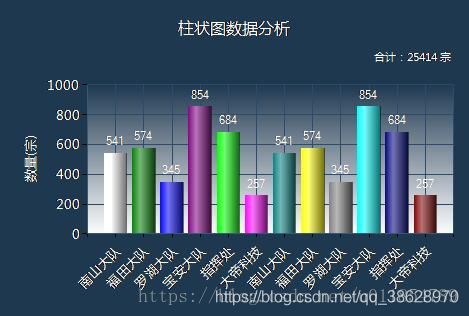
在这里插入图片描述
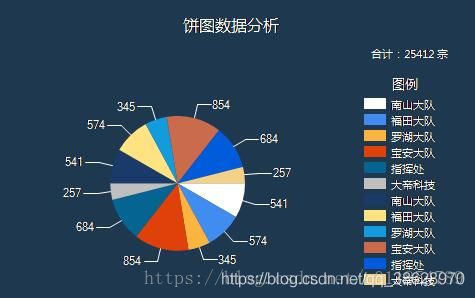
在这里插入图片描述

在这里插入图片描述
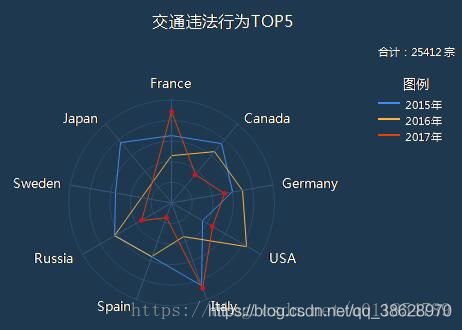
4.关于数据的绑定
将要显示的X轴和Y轴的数据分别放到两个数组里在, 然后绑定即可。
cht1.Series[0].Points.DataBindXY(x, y);
完整的代码如下:
复制代码
using System;
using System.Collections.Generic;
using System.Linq;
using System.Web;
using System.Web.UI;
using System.Web.UI.WebControls;
using System.Drawing;
using System.Web.UI.DataVisualization.Charting;
public partial class _Default : System.Web.UI.Page
{
protected void Page_Load(object sender, EventArgs e)
{
string[] x = new string[] { “南山大队”, “福田大队”, “罗湖大队”, “宝安大队”, “指挥处”, “大帝科技”, “南山大队”, “福田大队”, “罗湖大队”, “宝安大队”, “指挥处”, “大帝科技”};
double[] y = new double[] { 541, 574, 345, 854, 684, 257, 541, 574, 345, 854, 684, 257 };
string[] z = new string[] { “”, “”, “”, “”, “”, “”, “”, “”, “”, “”, “”, “” };
string[] a = new string[] { "南山大队", "福田大队", "罗湖大队", "宝安大队", "指挥处", };
double[] b = new double[] { 541, 574, 345, 854, 257 };
#region 柱状图
//标题
cht1.Titles.Add("柱状图数据分析");
cht1.Titles[0].ForeColor = Color.White;
cht1.Titles[0].Font = new Font("微软雅黑", 12f, FontStyle.Regular);
cht1.Titles[0].Alignment = ContentAlignment.TopCenter;
cht1.Titles.Add("合计:25414 宗");
cht1.Titles[1].ForeColor = Color.White;
cht1.Titles[1].Font = new Font("微软雅黑", 8f, FontStyle.Regular);
cht1.Titles[1].Alignment = ContentAlignment.TopRight;
//控件背景
cht1.BackColor = Color.Transparent;
//图表区背景
cht1.ChartAreas[0].BackColor = Color.Transparent;
cht1.ChartAreas[0].BorderColor = Color.Transparent;
//X轴标签间距
cht1.ChartAreas[0].AxisX.Interval = 1;
cht1.ChartAreas[0].AxisX.LabelStyle.IsStaggered = true;
cht1.ChartAreas[0].AxisX.LabelStyle.Angle = -45;
cht1.ChartAreas[0].AxisX.TitleFont = new Font("微软雅黑", 14f, FontStyle.Regular);
cht1.ChartAreas[0].AxisX.TitleForeColor = Color.White;
//X坐标轴颜色
cht1.ChartAreas[0].AxisX.LineColor = ColorTranslator.FromHtml("#38587a"); ;
cht1.ChartAreas[0].AxisX.LabelStyle.ForeColor = Color.White;
cht1.ChartAreas[0].AxisX.LabelStyle.Font = new Font("微软雅黑", 10f, FontStyle.Regular);
//X坐标轴标题
//cht1.ChartAreas[0].AxisX.Title = "数量(宗)";
//cht1.ChartAreas[0].AxisX.TitleFont = new Font("微软雅黑", 10f, FontStyle.Regular);
//cht1.ChartAreas[0].AxisX.TitleForeColor = Color.White;
//cht1.ChartAreas[0].AxisX.TextOrientation = TextOrientation.Horizontal;
//cht1.ChartAreas[0].AxisX.ToolTip = "数量(宗)";
//X轴网络线条
cht1.ChartAreas[0].AxisX.MajorGrid.Enabled = true;
cht1.ChartAreas[0].AxisX.MajorGrid.LineColor = ColorTranslator.FromHtml("#2c4c6d");
//Y坐标轴颜色
cht1.ChartAreas[0].AxisY.LineColor = ColorTranslator.FromHtml("#38587a");
cht1.ChartAreas[0].AxisY.LabelStyle.ForeColor = Color.White;
cht1.ChartAreas[0].AxisY.LabelStyle.Font = new Font("微软雅黑", 10f, FontStyle.Regular);
//Y坐标轴标题
cht1.ChartAreas[0].AxisY.Title = "数量(宗)";
cht1.ChartAreas[0].AxisY.TitleFont = new Font("微软雅黑", 10f, FontStyle.Regular);
cht1.ChartAreas[0].AxisY.TitleForeColor = Color.White;
cht1.ChartAreas[0].AxisY.TextOrientation = TextOrientation.Rotated270;
cht1.ChartAreas[0].AxisY.ToolTip = "数量(宗)";
//Y轴网格线条
cht1.ChartAreas[0].AxisY.MajorGrid.Enabled = true;
cht1.ChartAreas[0].AxisY.MajorGrid.LineColor = ColorTranslator.FromHtml("#2c4c6d");
cht1.ChartAreas[0].AxisY2.LineColor = Color.Transparent;
cht1.ChartAreas[0].BackGradientStyle = GradientStyle.TopBottom;
Legend legend = new Legend("legend");
legend.Title = "legendTitle";
cht1.Series[0].XValueType = ChartValueType.String; //设置X轴上的值类型
cht1.Series[0].Label = "#VAL"; //设置显示X Y的值
cht1.Series[0].LabelForeColor = Color.White;
cht1.Series[0].ToolTip = "#VALX:#VAL"; //鼠标移动到对应点显示数值
cht1.Series[0].ChartType = SeriesChartType.Column; //图类型(折线)
cht1.Series[0].Color = Color.Lime;
cht1.Series[0].LegendText = legend.Name;
cht1.Series[0].IsValueShownAsLabel = true;
cht1.Series[0].LabelForeColor = Color.White;
cht1.Series[0].CustomProperties = "DrawingStyle = Cylinder";
cht1.Legends.Add(legend);
cht1.Legends[0].Position.Auto = false;
//绑定数据
cht1.Series[0].Points.DataBindXY(x, y);
cht1.Series[0].Points[0].Color = Color.White;
cht1.Series[0].Palette = ChartColorPalette.Bright;
#endregion
#region 饼图
//标题
cht2.Titles.Add("饼图数据分析");
cht2.Titles[0].ForeColor = Color.White;
cht2.Titles[0].Font = new Font("微软雅黑", 12f, FontStyle.Regular);
cht2.Titles[0].Alignment = ContentAlignment.TopCenter;
cht2.Titles.Add("合计:25412 宗");
cht2.Titles[1].ForeColor = Color.White;
cht2.Titles[1].Font = new Font("微软雅黑", 8f, FontStyle.Regular);
cht2.Titles[1].Alignment = ContentAlignment.TopRight;
//控件背景
cht2.BackColor = Color.Transparent;
//图表区背景
cht2.ChartAreas[0].BackColor = Color.Transparent;
cht2.ChartAreas[0].BorderColor = Color.Transparent;
//X轴标签间距
cht2.ChartAreas[0].AxisX.Interval = 1;
cht2.ChartAreas[0].AxisX.LabelStyle.IsStaggered = true;
cht2.ChartAreas[0].AxisX.LabelStyle.Angle = -45;
cht2.ChartAreas[0].AxisX.TitleFont = new Font("微软雅黑", 14f, FontStyle.Regular);
cht2.ChartAreas[0].AxisX.TitleForeColor = Color.White;
//X坐标轴颜色
cht2.ChartAreas[0].AxisX.LineColor = ColorTranslator.FromHtml("#38587a"); ;
cht2.ChartAreas[0].AxisX.LabelStyle.ForeColor = Color.White;
cht2.ChartAreas[0].AxisX.LabelStyle.Font = new Font("微软雅黑", 10f, FontStyle.Regular);
//X坐标轴标题
cht2.ChartAreas[0].AxisX.Title = "数量(宗)";
cht2.ChartAreas[0].AxisX.TitleFont = new Font("微软雅黑", 10f, FontStyle.Regular);
cht2.ChartAreas[0].AxisX.TitleForeColor = Color.White;
cht2.ChartAreas[0].AxisX.TextOrientation = TextOrientation.Horizontal;
cht2.ChartAreas[0].AxisX.ToolTip = "数量(宗)";
//X轴网络线条
cht2.ChartAreas[0].AxisX.MajorGrid.Enabled = true;
cht2.ChartAreas[0].AxisX.MajorGrid.LineColor = ColorTranslator.FromHtml("#2c4c6d");
//Y坐标轴颜色
cht2.ChartAreas[0].AxisY.LineColor = ColorTranslator.FromHtml("#38587a");
cht2.ChartAreas[0].AxisY.LabelStyle.ForeColor = Color.White;
cht2.ChartAreas[0].AxisY.LabelStyle.Font = new Font("微软雅黑", 10f, FontStyle.Regular);
//Y坐标轴标题
cht2.ChartAreas[0].AxisY.Title = "数量(宗)";
cht2.ChartAreas[0].AxisY.TitleFont = new Font("微软雅黑", 10f, FontStyle.Regular);
cht2.ChartAreas[0].AxisY.TitleForeColor = Color.White;
cht2.ChartAreas[0].AxisY.TextOrientation = TextOrientation.Rotated270;
cht2.ChartAreas[0].AxisY.ToolTip = "数量(宗)";
//Y轴网格线条
cht2.ChartAreas[0].AxisY.MajorGrid.Enabled = true;
cht2.ChartAreas[0].AxisY.MajorGrid.LineColor = ColorTranslator.FromHtml("#2c4c6d");
cht2.ChartAreas[0].AxisY2.LineColor = Color.Transparent;
//背景渐变
cht2.ChartAreas[0].BackGradientStyle = GradientStyle.None;
//图例样式
Legend legend2 = new Legend("#VALX");
legend2.Title = "图例";
legend2.TitleBackColor = Color.Transparent;
legend2.BackColor = Color.Transparent;
legend2.TitleForeColor = Color.White;
legend2.TitleFont = new Font("微软雅黑", 10f, FontStyle.Regular);
legend2.Font = new Font("微软雅黑", 8f, FontStyle.Regular);
legend2.ForeColor = Color.White;
cht2.Series[0].XValueType = ChartValueType.String; //设置X轴上的值类型
cht2.Series[0].Label = "#VAL"; //设置显示X Y的值
cht2.Series[0].LabelForeColor = Color.White;
cht2.Series[0].ToolTip = "#VALX:#VAL(宗)"; //鼠标移动到对应点显示数值
cht2.Series[0].ChartType = SeriesChartType.Pie; //图类型(折线)
cht2.Series[0].Color = Color.Lime;
cht2.Series[0].LegendText = legend2.Name;
cht2.Series[0].IsValueShownAsLabel = true;
cht2.Series[0].LabelForeColor = Color.White;
cht2.Series[0].CustomProperties = "DrawingStyle = Cylinder";
cht2.Series[0].CustomProperties = "PieLabelStyle = Outside";
cht2.Legends.Add(legend2);
cht2.Legends[0].Position.Auto = true;
cht2.Series[0].IsValueShownAsLabel = true;
//是否显示图例
cht2.Series[0].IsVisibleInLegend = true;
cht2.Series[0].ShadowOffset = 0;
//饼图折线
cht2.Series[0]["PieLineColor"] = "White";
//绑定数据
cht2.Series[0].Points.DataBindXY(x, y);
cht2.Series[0].Points[0].Color = Color.White;
//绑定颜色
cht2.Series[0].Palette = ChartColorPalette.BrightPastel;
#endregion
#region Bar图
//标题
cht3.Titles.Add("交通违法行为TOP5");
cht3.Titles[0].ForeColor = Color.White;
cht3.Titles[0].Font = new Font("微软雅黑", 12f, FontStyle.Regular);
cht3.Titles[0].Alignment = ContentAlignment.TopCenter;
cht3.Titles.Add("合计:25412 宗 ");
cht3.Titles[1].ForeColor = Color.White;
cht3.Titles[1].Font = new Font("微软雅黑", 8f, FontStyle.Regular);
cht3.Titles[1].Alignment = ContentAlignment.TopRight;
//控件背景
cht3.BackColor = Color.Transparent;
//图表区背景
cht3.ChartAreas[0].BackColor = Color.Transparent;
cht3.ChartAreas[0].BorderColor = Color.Transparent;
//X轴标签间距
cht3.ChartAreas[0].AxisX.Interval = 1;
cht3.ChartAreas[0].AxisX.LabelStyle.IsStaggered = true;
cht3.ChartAreas[0].AxisX.LabelStyle.Angle = -45;
cht3.ChartAreas[0].AxisX.TitleFont = new Font("微软雅黑", 14f, FontStyle.Regular);
cht3.ChartAreas[0].AxisX.TitleForeColor = Color.White;
//X坐标轴颜色
cht3.ChartAreas[0].AxisX.LineColor = ColorTranslator.FromHtml("#38587a"); ;
cht3.ChartAreas[0].AxisX.LabelStyle.ForeColor = Color.White;
cht3.ChartAreas[0].AxisX.LabelStyle.Font = new Font("微软雅黑", 10f, FontStyle.Regular);
//X坐标轴标题
//cht3.ChartAreas[0].AxisX.Title = "数量(宗)";
//cht3.ChartAreas[0].AxisX.TitleFont = new Font("微软雅黑", 10f, FontStyle.Regular);
//cht3.ChartAreas[0].AxisX.TitleForeColor = Color.White;
//cht3.ChartAreas[0].AxisX.TextOrientation = TextOrientation.Auto;
//cht3.ChartAreas[0].AxisX.ToolTip = "数量(宗)";
//X轴网络线条
cht3.ChartAreas[0].AxisX.MajorGrid.Enabled = true;
cht3.ChartAreas[0].AxisX.MajorGrid.LineColor = ColorTranslator.FromHtml("#2c4c6d");
//Y坐标轴颜色
cht3.ChartAreas[0].AxisY.LineColor = ColorTranslator.FromHtml("#38587a");
cht3.ChartAreas[0].AxisY.LabelStyle.ForeColor = Color.White;
cht3.ChartAreas[0].AxisY.LabelStyle.Font = new Font("微软雅黑", 10f, FontStyle.Regular);
//Y坐标轴标题
//cht3.ChartAreas[0].AxisY.Title = "数量(宗)";
//cht3.ChartAreas[0].AxisY.TitleFont = new Font("微软雅黑", 10f, FontStyle.Regular);
//cht3.ChartAreas[0].AxisY.TitleForeColor = Color.White;
//cht3.ChartAreas[0].AxisY.TextOrientation = TextOrientation.Auto;
//cht3.ChartAreas[0].AxisY.ToolTip = "数量(宗)";
//Y轴网格线条
cht3.ChartAreas[0].AxisY.MajorGrid.Enabled = true;
cht3.ChartAreas[0].AxisY.MajorGrid.LineColor = ColorTranslator.FromHtml("#2c4c6d");
cht3.ChartAreas[0].AxisY2.LineColor = Color.Transparent;
cht3.ChartAreas[0].AxisX.IsMarginVisible = false;
cht3.ChartAreas[0].Area3DStyle.Enable3D = true;
//背景渐变
cht2.ChartAreas[0].BackGradientStyle = GradientStyle.None;
//图例样式
Legend legend3 = new Legend("#VALX");
legend3.Title = "图例";
legend3.TitleBackColor = Color.Transparent;
legend3.BackColor = Color.Transparent;
legend3.TitleForeColor = Color.White;
legend3.TitleFont = new Font("微软雅黑", 10f, FontStyle.Regular);
legend3.Font = new Font("微软雅黑", 8f, FontStyle.Regular);
legend3.ForeColor = Color.White;
cht3.Series[0].XValueType = ChartValueType.String; //设置X轴上的值类型
cht3.Series[0].Label = "#VAL"; //设置显示X Y的值
cht3.Series[0].LabelForeColor = Color.White;
cht3.Series[0].ToolTip = "#VALX:#VAL(宗)"; //鼠标移动到对应点显示数值
cht3.Series[0].ChartType = SeriesChartType.Bar; //图类型(折线)
cht3.Series[0].Color = Color.Lime;
//cht3.Series[0].LegendText = legend3.Name;
cht3.Series[0].IsValueShownAsLabel = true;
cht3.Series[0].LabelForeColor = Color.White;
cht3.Series[0].CustomProperties = "DrawingStyle = Cylinder";
cht3.Series[0].CustomProperties = "PieLabelStyle = Outside";
//cht3.Legends.Add(legend3);
//cht3.Legends[0].Position.Auto = true;
//是否显示图例
cht3.Series[0].IsVisibleInLegend = true;
cht3.Series[0].ShadowOffset = 0;
//饼图折线
cht3.Series[0]["PieLineColor"] = "White";
//绑定数据
cht3.Series[0].Points.DataBindXY(a, b);
//cht3.Series[0].Points[0].Color = Color.White;
//绑定颜色
cht3.Series[0].Palette = ChartColorPalette.BrightPastel;
//for (int n = 0; n < x.Length; n++)
//{
// int ptIdx = cht3.Series[0].Points.AddY(Convert.ToDouble(y[n]));
// DataPoint pt = this.cht3.Series[0].Points[ptIdx];
// pt.LegendText = x[n] + " " + "#PERCENT{P2}" + " [ " + "#VAL{D} 次" + " ]";//右边标签列显示的文字
// pt.Label = x[n] + " " + "#PERCENT{P2}" + " [ " + "#VAL{D} 次" + " ]"; //圆饼外显示的信息
// // pt.LabelToolTip = "#PERCENT{P2}";
// //pt.LabelBorderColor = Color.Red;//文字背景色
//}
#endregion
#region 雷达图
// //标题
cht4.Titles.Add(“交通违法行为TOP5”);
cht4.Titles[0].ForeColor = Color.White;
cht4.Titles[0].Font = new Font(“微软雅黑”, 12f, FontStyle.Regular);
cht4.Titles[0].Alignment = ContentAlignment.TopCenter;
cht4.Titles.Add("合计:25412 宗 ");
cht4.Titles[1].ForeColor = Color.White;
cht4.Titles[1].Font = new Font(“微软雅黑”, 8f, FontStyle.Regular);
cht4.Titles[1].Alignment = ContentAlignment.TopRight;
//控件背景
cht4.BackColor = Color.Transparent;
cht4.ChartAreas[0].BackColor = Color.Transparent;
cht4.ChartAreas[0].BorderColor = Color.Transparent;
//X轴标签间距
cht4.ChartAreas[0].AxisX.Interval = 1;
cht4.ChartAreas[0].AxisX.LabelStyle.IsStaggered = true;
cht4.ChartAreas[0].AxisX.LabelStyle.Angle = -45;
cht4.ChartAreas[0].AxisX.TitleFont = new Font("微软雅黑", 14f, FontStyle.Regular);
cht4.ChartAreas[0].AxisX.TitleForeColor = Color.White;
//X坐标轴颜色
cht4.ChartAreas[0].AxisX.LineColor = ColorTranslator.FromHtml("#38587a"); ;
cht4.ChartAreas[0].AxisX.LabelStyle.ForeColor = Color.White;
cht4.ChartAreas[0].AxisX.LabelStyle.Font = new Font("微软雅黑", 10f, FontStyle.Regular);
//X坐标轴标题
//cht4.ChartAreas[0].AxisX.Title = "数量(宗)";
//cht4.ChartAreas[0].AxisX.TitleFont = new Font("微软雅黑", 10f, FontStyle.Regular);
//cht4.ChartAreas[0].AxisX.TitleForeColor = Color.White;
//cht4.ChartAreas[0].AxisX.TextOrientation = TextOrientation.Auto;
//cht4.ChartAreas[0].AxisX.ToolTip = "数量(宗)";
//X轴网络线条
cht4.ChartAreas[0].AxisX.MajorGrid.Enabled = true;
cht4.ChartAreas[0].AxisX.MajorGrid.LineColor = ColorTranslator.FromHtml("#2c4c6d");
//Y坐标轴颜色
cht4.ChartAreas[0].AxisY.LineColor = ColorTranslator.FromHtml("#38587a");
cht4.ChartAreas[0].AxisY.LabelStyle.ForeColor = Color.White;
cht4.ChartAreas[0].AxisY.LabelStyle.Font = new Font("微软雅黑", 10f, FontStyle.Regular);
//Y坐标轴标题
//cht4.ChartAreas[0].AxisY.Title = "数量(宗)";
//cht4.ChartAreas[0].AxisY.TitleFont = new Font("微软雅黑", 10f, FontStyle.Regular);
//cht4.ChartAreas[0].AxisY.TitleForeColor = Color.White;
//cht4.ChartAreas[0].AxisY.TextOrientation = TextOrientation.Auto;
//cht4.ChartAreas[0].AxisY.ToolTip = "数量(宗)";
//Y轴网格线条
cht4.ChartAreas[0].AxisY.MajorGrid.Enabled = true;
cht4.ChartAreas[0].AxisY.MajorGrid.LineColor = ColorTranslator.FromHtml("#2c4c6d");
cht4.ChartAreas[0].AxisY2.LineColor = Color.Transparent;
cht4.ChartAreas[0].AxisX.IsMarginVisible = false;
cht4.ChartAreas[0].Area3DStyle.Enable3D = true;
cht4.ChartAreas[0].AxisX.IsInterlaced = false;
cht4.ChartAreas[0].AxisX.IsMarginVisible = false;
//刻度线
cht4.ChartAreas[0].AxisY.MajorTickMark.Enabled = false;
//cht4.ChartAreas[0].AxisX.MajorGrid.Enabled = false;
//cht4.ChartAreas[0].AxisY.MajorGrid.Enabled = false;
//cht4.ChartAreas[0].AxisX.MajorTickMark.Enabled = false;
cht4.ChartAreas[0].AxisY.LabelStyle.Enabled = false;
//背景渐变
cht4.ChartAreas[0].BackGradientStyle = GradientStyle.None;
//cht4.ChartAreas[0].AxisX2.InterlacedColor = Color.Red;
//cht4.ChartAreas[0].AxisY2.InterlacedColor = Color.Red;
//cht4.ChartAreas[0].BorderWidth = 0;
//cht4.ChartAreas[0].BackSecondaryColor = Color.Red;
//cht4.ChartAreas[0].BackImageTransparentColor = Color.Red;
//cht4.ChartAreas[0].AxisX.InterlacedColor = Color.Red;
//cht4.ChartAreas[0].AxisX.LineColor = Color.Red;
//cht4.ChartAreas[0].AxisX2.LineColor = Color.Red;
//cht4.ChartAreas[0].AxisX2.MajorGrid.LineColor = Color.Red;
//cht4.ChartAreas[0].AxisX2.MajorTickMark.LineColor = Color.Red;
//cht4.ChartAreas[0].AxisX2.MinorTickMark.LineColor = Color.Red;
//cht4.ChartAreas[0].AxisY.InterlacedColor = Color.Red;
//cht4.ChartAreas[0].AxisY.LineColor = Color.Red;
//cht4.ChartAreas[0].AxisY2.InterlacedColor = Color.Red;
//cht4.ChartAreas[0].AxisY2.LineColor = Color.Red;
//cht4.ChartAreas[0].AxisY2.MajorGrid.LineColor = Color.Red;
//cht4.ChartAreas[0].AxisY2.MajorTickMark.LineColor = Color.Red;
//cht4.ChartAreas[0].AxisY2.MinorTickMark.LineColor = Color.Red;
//图例样式
Legend legend4 = new Legend();
legend4.Title = "图例";
legend4.TitleBackColor = Color.Transparent;
legend4.BackColor = Color.Transparent;
legend4.TitleForeColor = Color.White;
legend4.TitleFont = new Font("微软雅黑", 10f, FontStyle.Regular);
legend4.Font = new Font("微软雅黑", 8f, FontStyle.Regular);
legend4.ForeColor = Color.White;
cht4.Legends.Add(legend4);
cht4.Legends[0].Position.Auto = true;
//Series1
cht4.Series[0].XValueType = ChartValueType.String;
cht4.Series[0].Label = "#VAL";
cht4.Series[0].LabelForeColor = Color.White;
cht4.Series[0].ToolTip = "#LEGENDTEXT:#VAL(宗)";
cht4.Series[0].ChartType = SeriesChartType.Radar;
cht4.Series[0]["RadarDrawingStyle"] = "Line";
cht4.Series[0].LegendText = "2015年";
cht4.Series[0].IsValueShownAsLabel = true;
//Series2
cht4.Series.Add(new Series("Series2"));
cht4.Series[1].Label = "#VAL";
cht4.Series[1].LabelForeColor = Color.White;
cht4.Series[1].ToolTip = "#LEGENDTEXT:#VAL(宗)";
cht4.Series[1].ChartType = SeriesChartType.Radar;
cht4.Series[1]["RadarDrawingStyle"] = "Line";
cht4.Series[1].LegendText = "2016年";
cht4.Series[1].IsValueShownAsLabel = true;
//Series3
cht4.Series.Add(new Series("Series3"));
cht4.Series[2].Label = "#VAL";
cht4.Series[2].LabelForeColor = Color.White;
cht4.Series[2].ToolTip = "#LEGENDTEXT:#VAL(宗)";
cht4.Series[2].ChartType = SeriesChartType.Radar;
cht4.Series[2]["RadarDrawingStyle"] = "Line";
cht4.Series[2].LegendText = "2017年";
cht4.Series[2].IsValueShownAsLabel = true;
double[] yValues = { 65.62, 75.54, 60.45, 34.73, 85.42, 55.9, 63.6, 55.2, 77.1 };
string[] xValues = { "France", "Canada", "Germany", "USA", "Italy", "Spain", "Russia", "Sweden", "Japan" };
//Seris2
double[] y2 = { 45.62, 65.54, 70.45, 84.73, 35.42, 55.9, 63.6 };
double[] y3 = { 88.62, 35.54, 52.45, 45.73, 88.42, 14.9, 33.6 };
this.cht4.Series[0].Points.DataBindXY(xValues, yValues);
this.cht4.Series[1].Points.DataBindY(y2);
this.cht4.Series[2].Points.DataBindY(y3);
//设置X轴显示间隔为1,X轴数据比较多的时候比较有用
cht4.ChartAreas[0].AxisX.LabelStyle.Interval = 1;
//设置XY轴标题的名称所在位置位远
cht4.ChartAreas[0].AxisX.TitleAlignment = StringAlignment.Near;
for (int i = 0; i < cht4.Series[2].Points.Count; i++)
{
cht4.Series[2].Points[i].MarkerStyle = MarkerStyle.Circle;//设置折点的风格
cht4.Series[2].Points[i].MarkerColor = Color.Red;//设置seires中折点的颜色
// cht4.Series[1].Points[i].MarkerStyle = MarkerStyle.Square;//设置折点的风格
// cht4.Series[1].Points[i].MarkerColor = Color.Blue;//设置seires中折点的颜色
// cht4.Series[2].Points[i].MarkerStyle = MarkerStyle.Square;//设置折点的风格
// cht4.Series[2].Points[i].MarkerColor = Color.Green;//设置seires中折点的颜色
}
for (int i = 0; i < cht4.Series.Count; i++)
{
for (int j = 0; j < cht4.Series[i].Points.Count; j++)
{
cht4.Series[i].Points[j].Label = " ";
//cht4.Series[i].Points[j].LabelToolTip = "string.Empty";
}
}
//cht4.ImageType = ChartImageType.Jpeg;
//反锯齿
cht4.AntiAliasing = AntiAliasingStyles.All;
//调色板 磨沙:SemiTransparent
cht4.Palette = ChartColorPalette.BrightPastel;
cht4.Series[0].ChartType = SeriesChartType.Radar;
cht4.Series[1].ChartType = SeriesChartType.Radar;
cht4.Series[2].ChartType = SeriesChartType.Radar;
cht4.Width = 500;
cht4.Height = 350;
#endregion
/*
#VALX 显示当前图例的X轴的对应文本(或数据)
#VAL, #VALY, 显示当前图例的Y轴的对应文本(或数据)
#VALY2, #VALY3, 显示当前图例的辅助Y轴的对应文本(或数据)
#SER: 显示当前图例的名称
#LABEL 显示当前图例的标签文本
#INDEX 显示当前图例的索引
#PERCENT 显示当前图例的所占的百分比
#TOTAL 总数量
#LEGENDTEXT 图例文本
*/
}